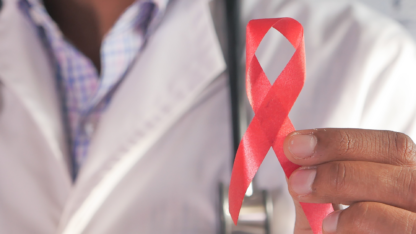Metro Atlanta is one of the largest HIV hotspots in the nation.
The metro area had the third-highest rate of new HIV diagnoses among U.S. metro areas in 2021, accounting for over 1,500 new cases. Memphis and Miami were the only cities that ranked higher, according to new data from the Centers for Disease Control and Prevention.
Metro Atlanta accounted for more than half of all new HIV diagnoses in Georgia that year. Also Fulton and DeKalb counties had the first- and second-highest rate of new infections of any county in the nation, at about 50 cases per 100,000 people.
“These numbers serve as a reminder that much work needs to be done to end the HIV epidemic in Atlanta,” said Jeff Cheek, director of the Fulton County Department for HIV Elimination, in a statement to WABE.
The department, formerly known as Ryan White, specializes in providing medical services to low-income, uninsured or underinsured HIV patients throughout metro Atlanta.
According to AIDSVU, 83.2% of the 2021 cases in metro Atlanta stemmed from male-to-male sexual contact and roughly 73% of those diagnosed were Black.
Statewide, Georgia’s overall HIV rates are some of the highest in the country at 59,490, with the South region accounting for over half of the new cases found at 18,728, according to the CDC.
Cheek said that these alarming figures prove there needs to be more urgency in providing prevention tools and resources to Georgia residents, including pre-exposure prophylaxis.
“And that persons living with HIV are connected with culturally competent care and support services as soon as possible,” he said. “We must also address those barriers that keep people from care such as lack of insurance, the need for food and housing, and mental health and substance abuse services.”
Cheek and the Department for HIV Elimination recently launched a new client-centered website that aims to make life easier for those living with HIV. The site identifies nearby service providers by proximity, gives detailed explanations of their services and shows provider ratings.
“Clients will see that they have a choice in their HIV care, as well as access to educational videos to feel more empowered and supported with their healthcare options,” said Cheek in the release.
The Fulton Department for HIV Elimination currently funds 23 agencies and allocates additional funding to related support services, such as non-medical case management, childcare, funding for transportation and food banks.
Atlanta LGBTQ advocates last month celebrated the opening of a new HIV-care clinic in Midtown.. The clinic also offers broader sexual health care and social-support services geared to its patient population of mostly Black gay men.









